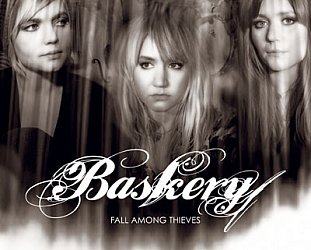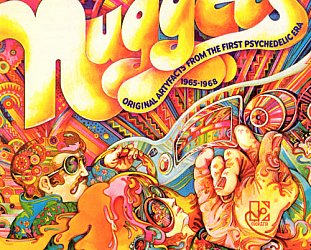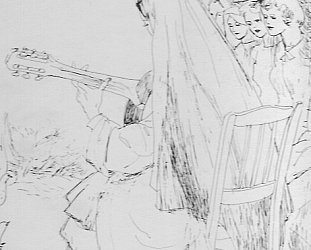Graham Reid | | 3 min read

For someone whose stark songs sound like they have come from the impoverished rural underbelly of Depression-era America, Gillian Welch seems as lively as a June-bug. She laughs readily and doesn't come across as a woman who sings death ballads and has the signature song Orphan Girl.
But Welch surprises on many levels. Those who have heard her spare singing on the soundtrack to O Brother, Where Art Thou?, or on four remarkable albums with her partner David Rawlings, might be surprised to learn she is no child of the Virginia backwoods but the adopted daughter of the Ken and Mitzie Welch comedy duo of New York.
Welch grew up in Los Angeles - her parents moved there to write music for The Carol Burnett Show - and went to university in Santa Cruz. She played in a Goth-rock outfit, was the drummer in a psychedelic surf band, by her own admission took plenty of acid, and then re-discovered bluegrass and folk.
"I grew up singing folk songs. As a kid I was taught Woody Guthrie and Carter Family songs because I went to a progressive hippie school. It wasn't until I started talking to reporters I put together how much I'd grown up in the folk tradition. So it was a return to what I was always doing."
With Rawlings, whom she met at Berklee School of Music in Boston, she started exploring old-time music, the songs and stories of an America grounded in the remote valleys of the Appalachians. Together they played small clubs but even then it was Welch's songs people wanted to hear.
"I've never tried to be traditional. It's been a springboard for me and I love it and revere it and would not be doing what I do without the music of the Munroe Brothers, the Stanley Brothers and the Carter Family. However, it was clear I was never going to be able to do exactly that; I'm a songwriter. There were very few people at gigs when all I did was Stanley Brothers songs."
Welch's debut album Revival in '96 and its follow-up, Hell Among the Yearlings two years later, were widely acclaimed for their authentic sound of traditional country music, although the songs were all originals.
In the late 90s the pair moved to Nashville because their favourite albums - from Bill Munroe and Johnny Cash to Bob Dylan's Blonde On Blonde and Neil Young's Comes A Time - had been recorded there.
"So I moved with this really romantic notion, never considering I was about 30 years too late. But a strange thing happened around the millennium. That other Nashville, the ghost of it, started to come to life for me. I started meeting musicians who had been involved in those landmark records. So I got in touch with this underground Nashville and we recorded our third album Time (The Revelator) in RCA Studio B, the historic studio where all these great records were made."
Welch's songs have grown within the limitations of her chosen genre although the touchstones are still evident: "When you write within a traditional melodic form everything sort of already exists, so it's kind of constricted," she laughs.
Welch is uncertain why this raw music has captured an audience - as someone in the middle she has zero perspective - but sees it as a reaction against finely-honed commercialism.
"We've reached an unprecedented level of slick because of technology. There are tools at our disposal so things which could not be polished and corrected before now can be. That's everything from a singer's pitch to the drummer's time. The way the singer looks, too."
"It's a new level of plasticine. You can make a choice and bring it about because of the tools. But the question becomes, 'Is that better?' "
"The acoustic music like old-time and duets - where Dave and I fall in - has a rough-around-the-edges aesthetic. It's a reaction to the other thing. No one put my band together, no one found me these songs, and I'm wearing my own clothes, even on my record covers. On records in stores people aren't wearing their own clothes but something someone gave them to help sell records. Maybe people don't know that, so maybe I shouldn't talk about it," she laughs.
"The world of whatever you want to call what we do is very different."
But it has captured educated urban audiences as much as those who grew up in the tradition, and while Welch rarely gets mainstream radio play, not even on American country stations, her songs sneak out through regional stations and public radio.
O Brother took her plain-spoken, elemental sound - and homey looks - to international audiences.
"The people who come to shows change depending on what city we're in. If we play London it's lots of musicians which is a big compliment, but then we play in a small town in Virginia where people grew up with that music. But it's almost disappeared for them.
"Everyone there knows we're not traditional and we don't claim to be the Carter Family reincarnated. In fact, I've never really played traditional music. People get confused about that, and it's a great wonderment to me."
Whatever it is Welch plays - old-time, rural folk, Americana troubadour - it is uniquely hers. And the lanky, shy girl who grew up in the 'burbs of California has reinvented an ancient form threatened with extinction.
For that, she's in the Country Music Hall of Fame in her adopted hometown, Nashville.







post a comment